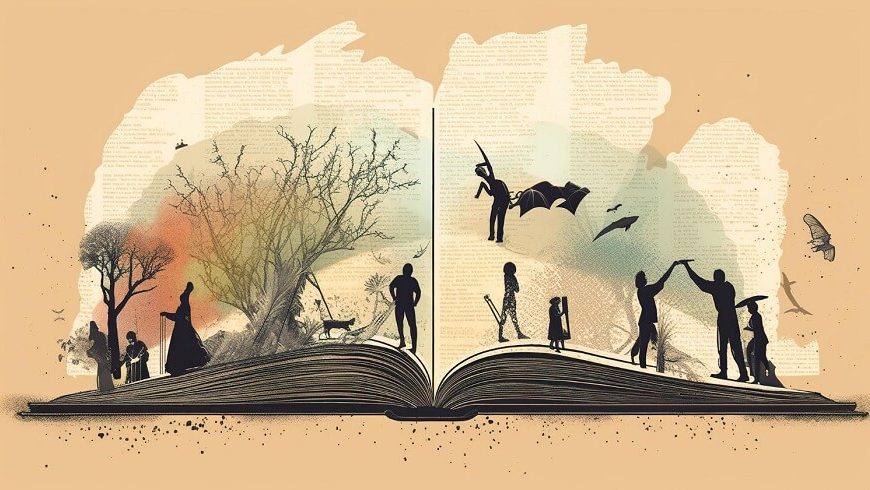Stories are a great source of entertainment for children. But they are also a powerful tool for teaching your children important life lessons and values. Indian folk tales, especially, carry the wisdom of generations and offer valuable life lessons and cultural insights in ways that captivate young minds.
In this article, we will look at five timeless Indian folk tales with moral lessons that captivate your little ones and provide valuable life lessons and cultural values.
Top 5 Indian Folk Tales with Moral Lessons
Here are five folk tales from the Panchatantra, a collection of Indian fables written around 200 BC. These tales were created by Pandu Vishnu Sharma, a respected Hindu scholar of that time. Originally written in Sanskrit, these stories have been translated into multiple languages. Each Panchatantra story carries an important moral lesson.
- The Clever Rabbit and the Foolish Lion
- The Four Friends and the Hunter
- The Wise Old Bird
- The Monkey and the Crocodile
- The King and the Foolish Monkey
‘The Foolish Lion and the Clever Rabbit’ is a well-known story that remains relevant and useful till now.
Once upon a time, a lion in a forest killed many animals every day. The animals decided to make a deal with the lion, promising to send one animal per day to be his meal, sparing the rest. One day, it was a rabbit’s turn to go to the lion. But this rabbit was clever and came up with a plan to get rid of the lion. He purposely arrived late. When the lion saw the rabbit, he roared angrily, “Why are you so late? I’m starving!” The rabbit calmly explained that he was going with other rabbits, but another lion stopped them.
Hearing this, the lion became furious and demanded to be taken to this “other lion.” The rabbit led him to a well and said, “The other lion is inside.” When the lion peered into the well, he saw his own reflection in the water. Thinking it was another lion, he jumped into the well to attack. But once he was inside, he realised he was trapped and couldn’t get out. That’s how the clever rabbit saved all the animals in the forest.
Moral: This Indian folk tale imparts the lesson that wit and intelligence can overcome might. It’s a classic example of brain over brawn, an invaluable lesson for children to learn that physical strength isn’t everything.
‘The Four Friends and the Hunter’ highlights the importance of friendship.
Once upon a time, in a dense jungle, lived four close friends: a deer, a crow, a turtle, and a rat. They spent most of their time together, enjoying each other’s company. One day, they spotted a hunter approaching and panicked. The crow quickly flew to the top of a tree, the rat scurried into a hole, and the deer dashed into the bushes to hide. However, the turtle, unable to move fast, was caught by the hunter, who placed him in a sack and walked away.
The three friends were determined to save the turtle and came up with a clever plan. The crow flew high to spot the hunter’s location, with the deer following behind. Once they reached the hunter, the deer took a different path, ran ahead, and pretended to be dead, lying motionless on the ground. When the hunter saw the deer, he was excited and rushed towards it, leaving his sack behind. Seizing the opportunity, the rat quickly chewed through the sack, freeing the turtle.
Just as the hunter approached, the deer sprang up and ran into the thick forest. Confused and frustrated, the hunter returned to where he had left his sack, only to find his sack empty. Disheartened, he went home empty-handed. Meanwhile, the four friends reunited and celebrated their clever escape, grateful for the strength of their friendship.
Moral: This story highlights the importance of friendship, teamwork, and the power of unity. It beautifully demonstrates that friends who work together can overcome any challenge.
Also Read –Mahabharata stories for kids
‘The Wise Old Bird’ teaches an important life lesson: ignoring wise advice can lead to regret and harm.
A flock of wild geese lived in a tall, leafy tree deep in a forest. Every morning, the geese would fly off to search for food and return to the same tree by nightfall. Among them was Uncle Goose, the oldest and wisest of the flock. He had seen many seasons and knew much about life, but he could no longer fly long distances because of his age. The younger geese, full of energy and confidence, often dismissed him, thinking he was too old to be taken seriously.
One day, Uncle Goose noticed a small creeper growing near the base of their tree. The tiny plant was beginning to wrap itself around the trunk. Uncle Goose called the younger geese and said, “My dear ones, do you see that creeper? It may seem harmless now, but if it grows, it could become a serious threat to us. Please cut it off while it’s still small. I’m too old to do it myself, but you’re strong and capable.”
The younger geese, however, didn’t take him seriously. “Oh, Uncle, it’s just a tiny plant,” they said. “How can it harm us? We’ll deal with it later.” They thought he was overreacting and went on with their lives, ignoring his advice.
As days turned into weeks, the creeper grew bigger and stronger. It wrapped itself tightly around the tree, reaching higher and higher. Uncle Goose reminded the younger geese again, “The creeper is growing fast. You must act now before it’s too late.” But the geese still ignored him. “We’ll do it later,” they said.
One day, a hunter came to the forest and saw the tall tree where the geese lived. He noticed the creeper and used it to climb up the tree easily. Before the geese could react, the hunter trapped them in a large net. When the geese realised they were caught, they were filled with regret.
Uncle Goose sighed and said, “I warned you about the creeper, but you didn’t listen. Now, it has become the cause of our downfall.”
Moral: This Indian folk tale reminds us of the importance of listening to wisdom and acting on it promptly. Ignoring good advice, especially when it comes from someone experienced, can lead to trouble.
‘The Monkey and the Crocodile’ is the story of a clever monkey and a cunning crocodile. The crocodile lived near a river with his wife; not far from their home was a tall berry tree where the monkey lived. The monkey would share delicious berries with the crocodile every day.
One day, the crocodile took some berries for his wife, who grew greedy and demanded something strange: she wanted to eat the monkey’s heart for dinner. The crocodile, unwilling to upset his wife, agreed to bring her the heart. The crocodile came up with a plan to trick the monkey. The crocodile invited the monkey to ride on its back and visit its home across the river. The monkey trusted the crocodile and climbed onto its back. Halfway across the river, the crocodile revealed its true intentions. It told the monkey it was taking it home so its wife could eat his heart. The monkey, though frightened, quickly came up with a plan to save himself. The monkey pretended to laugh and said, “Oh, my dear friend, you should have told me earlier! I left my heart on the tree. Let’s go back, and I’ll fetch it for you.”
The crocodile believed the monkey’s story and turned back toward the tree. As soon as they reached the riverbank, the monkey jumped off the crocodile’s back and climbed to the top of the tree. Safe in the branches, the monkey scolded the crocodile for betraying his trust. The crocodile realised he had been outsmarted and returned home empty-handed.
Moral: This Indian folk tale highlights the virtue of quick thinking in the face of deceit and betrayal. It teaches children that the presence of the mind can save them from tricky situations.
‘The King and the Foolish Monkey’ narrates the tale of a king and his pet monkey. The king was very fond of the monkey, treating him like a royal servant and giving him privileges no other animal enjoyed. However, the monkey, despite his loyalty, was not very wise and often failed to distinguish between good intentions and foolish actions.
One afternoon, as the king rested, he placed his head in the monkey’s lap and fell asleep. While the king slept peacefully, a pesky fly began buzzing around, repeatedly landing on his face. The monkey, eager to protect his master, tried to shoo the fly away, but it kept returning.
Frustrated and determined to get rid of the fly, the monkey saw the king’s sword lying nearby. When the fly landed on the king’s face again, the monkey decided to kill it once and for all. Unfortunately, in his foolish attempt, the monkey struck with the sword and ended up killing the king instead of the fly.
Moral: The moral of this story is that responsibility should be given only to those who have the wisdom to handle it. It speaks volumes about the necessity of understanding one’s limitations and capabilities.
Why are Indian Folk Tales Important for Kids?
Indian Folk tales are a wonderful way for children to learn and grow. Listening to or reading folk tales can spark a child’s imagination and creativity. These stories often introduce kids to different cultures, traditions, and ways of life, helping them develop empathy and respect for others. They also encourage critical thinking and problem-solving skills, as children try to predict how characters will overcome challenges.
Folk tales also create opportunities for parents to bond with their children. After sharing a story, parents can discuss its message and how it relates to real-life situations. This helps kids enjoy the tale, understand its deeper meaning, and apply it to their lives.
Conclusion
Indian folk tales are not just the fireside entertainment of yesteryears but also serve as conduits of morals and values. These famous folk tales continue to offer a repository of wisdom through their simple yet profound narratives. They mirror India’s cultural richness and philosophical depth, capturing children’s imaginations and instilling moral values that lay the foundation for character development. Each story, with its unique characters and plot twists, brings with it a timeless moral, making Indian folk tales moral stories an essential part of children’s literature.
For fun and helpful articles about your child’s growth, health, and learning, explore the EuroKids blog. Don’t forget to explore EuroKids preschools , designed to provide your child with the perfect foundation for a bright educational journey!
You May Also Like These, Two Cats and a Monkey Story For Kids
















